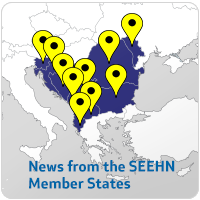Joint Statement
On behalf of the South Eastern Europe Health Network
At the 77TH Session of the World Health Assembly
within the plenary discussion session
delivered by BOSNIA AND HERZEGOVINA[1]
Geneva, May 2024
[1] DR. ALEN ŠERANIĆ, HEAD OF DELEGATION OF BOSNIA AND HERZEGOVINA, MINISTER OF HEALTH AND SOCIAL WELFARE OF THE REPUBLIC OF SRPSKA
Your Excellences, Director-General,
Regional-Director,
[Mister or Madam] President,
Honourable ministers,
Ladies and gentlemen,
I have the honour to speak on behalf of the nine Member States of the South Eastern Europe Health Network, who have associated themselves with this statement: Albania, Bulgaria, Bosnia and Herzegovina, the State of Israel, Republic of Moldova, Montenegro, the Republic of North Macedonia, Romania and the Republic of Serbia.
As Bosnia and Herzegovina finalizes its one year SEEHN Presidency, it proudly shares several significant achievements. Our primary focus has been on advancing universal health coverage and fostering people-centred health systems.
We strongly believe that strong regional strategic efforts are required in advancing the WHO global and regional agenda to achieve the SDGs 2030 targets and close the health outcomes’ gap between the SEE region and the European Union. In this context, the SEEHN in partnership with Slovenia organized a High-Level Meeting on Strengthening Healthcare Systems in Southeast Europe. The main outcomes of the meeting were enhanced resilience and preparedness of healthcare systems for future shocks and crises, spotted innovative solutions to address persistent health workforce shortages, and strengthened trust among various healthcare stakeholders.
Additionally, Bosnia and Herzegovina Presidency key efforts included promoting mental health reforms, particularly in developing community mental health services, as well as those in post-conflict settings. We have also prioritized the mental health and well-being of the healthcare workforce, especially in the aftermath of the pandemic.
Over the last two decades, the SEE Health Network, through Bosnia and Herzegovina, has championed mental health advancements, particularly in community settings. Leading experts from the SEE region have visited and extensively discussed the world-renowned Trieste mental health model. This initiative was a collaborative effort involving the SEEHN Secretariat, the Central European Initiative, and the WHO Collaborating Center for Research and Training in Mental Health, Trieste, Italy. It provided a platform for stakeholders to exchange experiences, learn about challenges, and compare the progress and policies shaping mental health services in the SEE region with the successful Trieste model.
In this respect, it is noteworthy that our actions and documents align closely with the WHO Global Strategic Directions for Nursing, Midwifery, and the corresponding European region roadmap. The South Eastern Europe Health Network is committed to optimizing healthcare workforce performance and investing strategically in this sector. In line with this commitment, we are pleased to announce a significant development: commencing in October this year, Romania will officially host the Regional Health Development Center for Nursing and Midwifery, under SEEHN’s auspices. This center will also host the ICN meeting in Bucharest, advancing our regional agenda. At the same time, we express gratitude to the WHO Collaborative Center for Leadership and Governance in Nursing, hosted by Israel, for active support and contribution to strengthen the capacity of the nursing aimed at improved quality of care in the SEE region.
Furthermore, just a week ago, SEEHN Member States convened in Banja Luka, Republic of Srpska, Bosnia and Herzegovina to advance nursing leadership and discuss strategies to secure the future of the healthcare workforce and the provision of high-quality care. This meeting focused on addressing nursing and midwifery challenges and planning the next steps.
The past year has been marked by actions focused on data quality improvement and control, non-communicable diseases population-based registries; improvement and promotion of patients’ rights; pandemic preparedness, influenza surveillance, and immunization.
On this occasion, I would like to express our true gratitude to the World Health Organization and in particular to its European Regional Office and the Regional Director, Dr Hans Kluge for his steady support to the SEEHN.
Also, our sincere appreciation to the WHO Director General Dr Tedros Adhanom Ghebreyesus for the support to the SEE Region, in advancing health equity and health systems resilience in this turbulent world.
Thank you for your attention.





